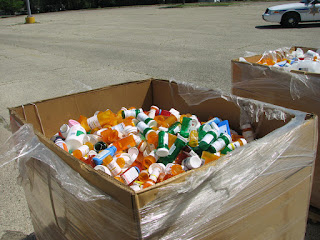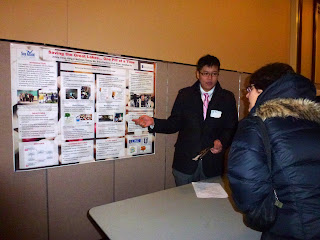April 23rd, 2013 by Irene Miles
 IISG science writer Anjanette Riley was in attendance at the University of Illinois’ Student Health Fair April 17 and sent in this post about the event.
IISG science writer Anjanette Riley was in attendance at the University of Illinois’ Student Health Fair April 17 and sent in this post about the event.
—
At a booth in the heart of the Student Health Fair held yesterday at the University of Illinois Urbana-Champaign, one important question could be heard throughout the day: If I shouldn’t flush them down the toilet, what am I supposed to do with my unused medications?
IISG’s Laura Kammin and Corrie Maxwell Layfield were there to communicate the importance of properly disposing of medicines. During the one-day event, Laura and Corrie talked with more than 130 people about the health and environmental risks posed by pharmaceutical pollution and how they could safely dispose of unwanted medicines. Visitors were also told about the nationwide medicine takeback event coming up on April 27 where they could drop off human and pet medications at locations throughout Illinois.
Amid the buzz and bustle of the crowded fair, many students lingered at IISG’s booth with additional questions about research on the effects of pharmaceuticals in water and locations of permanent collection programs. Most were surprised to learn that pharmaceutical chemicals have been found in lakes and rivers and linked with changes in wildlife behavior and health. Those who had heard of the dangers of flushing unwanted medication were also surprised to hear that pills thrown in the trash could leach into ground water or find their way to wastewater treatment plants.
But despite how much they knew about proper pharmaceutical disposal when they stopped at the booth, many left promising not to not to flush or throw away their medication in the future.
 “People get the “Don’t Flush” message,” said Kammin. “But it isn’t common knowledge yet that putting our unwanted meds in the trash just delays their trip to local water supplies. These students really got that message.”
“People get the “Don’t Flush” message,” said Kammin. “But it isn’t common knowledge yet that putting our unwanted meds in the trash just delays their trip to local water supplies. These students really got that message.”
Laura and Corrie also talked with university professors and fellow exhibitors interested in spreading the word about proper disposal. One professor wanted to incorporate pharmaceutical pollution into a class on environmental hazards. And exhibitors from health clinics and advocacy groups took IISG materials with information on collection programs and what to do when a program is not available to share with their patients and clients.
Learn more about properly disposing of unwanted medicines at our UnwantedMeds.org site, and for more information about the Drug Enforcement Administration’s National Prescription Drug Take-Back Day on April 27 including a list of locations, visit the DEA event website.
April 9th, 2013 by Irene Miles
Studies continue to show the presence and persistence of pharmaceuticals and other personal care products in waterways throughout the country. And improperly disposed-of medicines have been shown to have numerous detrimental effects on plants, animals, and environmental processes.
A forthcoming paper in Ecological Applications confirms the presence of pharmaceuticals in rivers throughout the U.S.
From Nature World News:
“As it turns out, the antihistamine diphenhydramine – used in treating allergic symptoms as well as motion sickness, insomnia and a cold – decreased a biofilm’s photosynthesis by 99 percent in addition to drops in respiration. And it didn’t stop there. The chemical compound actually caused a change in present bacterial species, including a reduction of a group that digests compounds produced by plants and algae.
Nor was it the only one tested to render similar results; in fact, all the pharmaceuticals involved in the study had a measurable and negative impact on biofilm respiration.”
Read the complete article at the link above, and find more information about the study at our UnwantedMeds.org site.
March 8th, 2013 by Irene Miles
 Last month, representatives from eight Sea Grant programs attended a two-day workshop in Jacksonville, FL hosted by Illinois-Indiana Sea Grant. Designed as an opportunity for specialists, educators, and communicators to build a national partnership on reducing pharmaceuticals and personal care products (PPCPs) in the nation’s waterways, the event was a first step in working towards coordinating these efforts.
Last month, representatives from eight Sea Grant programs attended a two-day workshop in Jacksonville, FL hosted by Illinois-Indiana Sea Grant. Designed as an opportunity for specialists, educators, and communicators to build a national partnership on reducing pharmaceuticals and personal care products (PPCPs) in the nation’s waterways, the event was a first step in working towards coordinating these efforts.
Funded by the NOAA National Sea Grant Office, the workshop brought together a wide range of input from people who have extensive experience working on the issue of PPCPs in waterways, allowing for a tremendous collaboration.
Out of the two-day workshop came a unified message: The ways people choose to use and dispose of PPCPs impacts water quality everywhere.
In months to come, workshop participants will continue to work together to develop programs that carry that message to local communities.
“This is a national problem that requires local action. Sea Grant’s new working group is well-suited to tackle this issue because each program is trusted in their communities,” said Laura Kammin, IISG pollution prevention program specialist. “We are sharing our resources to create a strong and effective national partnership.”
The meeting also provided an opportunity for representatives from New York, Pennsylvania, and Illinois-Indiana Sea Grant programs to mentor others by sharing their award-winning work on reducing PPCPs in the Great Lakes basin. These and other discussions opened the door for collaboration with the North Carolina, Georgia, Florida, Oregon, and Southern California Sea Grant programs.
IISG has been providing communities with information about how to start safe, legal medicine collection programs since 2006. So far, IISG has helped 63 communities in Illinois, Indiana, Wisconsin and Michigan with single-day or permanent collection programs, ensuring the proper disposal of 9.65 million pills (81,813 pounds of unused medication).
For more information on IISG’s efforts to spread the word about proper use and disposal of PPCPs visit www.unwantedmeds.org.
January 29th, 2013 by Irene Miles
 The Drug Enforcement Administration has published proposed regulations regarding the proper disposal of prescription pharmaceuticals and other controlled substances.
The Drug Enforcement Administration has published proposed regulations regarding the proper disposal of prescription pharmaceuticals and other controlled substances.
From the DEA’s release:
“This rule proposes requirements to govern the secure disposal of controlled substance medications by both DEA registrants and what the Controlled Substances Act refers to as “ultimate users” of these medications (patients and animals). The proposed regulations seek to expand the options available to collect these medications from ultimate users for the purpose of disposal, to include take-back events, mail-back programs, and collection box locations.”
The public comment period is open until February 19, and people can review the entire proposal online here.
For more information about why proper disposal of these substances is so important, visit our Unwanted Meds website.
January 3rd, 2013 by Irene Miles
 The University of Illinois’ Learning in Community (LINC) program provides service-learning opportunities for students to gain hands-on experience in a variety of fields while earning course credit towards their degree. The program also gives various departments and units at the University a chance to expand their mission and get students involved in critical issues.
The University of Illinois’ Learning in Community (LINC) program provides service-learning opportunities for students to gain hands-on experience in a variety of fields while earning course credit towards their degree. The program also gives various departments and units at the University a chance to expand their mission and get students involved in critical issues. This past fall term, the LINC Program offered a Sea Grant-focused course for eight University of Illinois students where they learned about environmental threats to local and regional waterways. They designed and executed projects based on what they had learned about proper disposal of unwanted medicines.
At the conclusion of the course, students developed five activities focused on water issues, informing a larger audience about their importance and local impacts.
The projects included:
– A presentation and activity for Urbana High School’s science club students
– An article in the Green Observer and accompanying Facebook page about the importance of proper disposal of pharmaceuticals
– Placement of brochures at the McKinley Health Center in coordination with the Directors of Health Education and the Pharmacy
– A plan to spread the message about proper medicine disposal at student dormitories and to involve students in medicine collection events in 2013
The course and projects that resulted informed current University of Illinois students about important environmental issues, while giving them experience collaborating with each other, working with local organizations and businesses, and performing outreach to share the information they learned with residents of Champaign-Urbana.
 IISG science writer Anjanette Riley was in attendance at the University of Illinois’ Student Health Fair April 17 and sent in this post about the event.
IISG science writer Anjanette Riley was in attendance at the University of Illinois’ Student Health Fair April 17 and sent in this post about the event.  “People get the “Don’t Flush” message,” said Kammin. “But it isn’t common knowledge yet that putting our unwanted meds in the trash just delays their trip to local water supplies. These students really got that message.”
“People get the “Don’t Flush” message,” said Kammin. “But it isn’t common knowledge yet that putting our unwanted meds in the trash just delays their trip to local water supplies. These students really got that message.”

